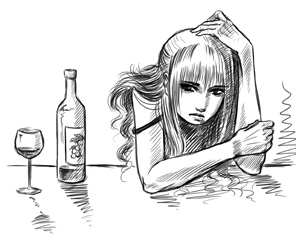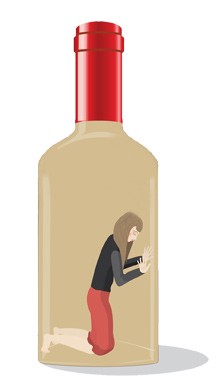The Tipsy Mom: Coping Our Way Through Motherhood
by Cheri Harkleroad
Ah Yes, Motherhood.

Coping
For some of us, coping comes in the form of a babysitter and a latte with a girlfriend. For others, maybe it’s spending some time at the spa or getting lost in a good book. But for some, the easiest escape is found in a drink or two. And it makes sense: alcohol is cheap, readily available and can provide immediate relief after a hard day.
Sure, it’s our full right as grown-ups to decide when, where and how much we are going to drink. But if the decisions we make begin to interfere with our ability to act in accordance with our values as mothers, we might want to rethink our choices.
Drinking too much? Click here for help.
 When Our Coping Becomes the Problem
When Our Coping Becomes the Problem
“… alarm bells should have been ringing. But my habit seemed relatively harmless. Common, even. A glass or two seemed innocent enough.” – Ann Dowsett Johnston
Of course, for many mothers, drinking isn’t a problem. The glass of wine at day’s end remains just one glass, and only on occasion. But for others, the drinking can get out of hand. When one glass becomes the whole bottle, or the gentle numbness to take the edge off becomes a complete blackout, maybe it’s time to take a look at whether our coping strategy is serving us well.
While it’s a personal decision as to whether we’re drinking too much, there are certainly some signs that our drinking has reached problematic levels. Addiction expert Tom Horvath, Ph.D., ABPP, says problematic drinking can include:
• drinking (too much) when watching the children
• activities that are more about drinking than the activity
• thinking about drinking when it’s time to be thinking about something else
• having a fuzzy memory (or no memory at all) of what you did during a drinking experience
• continuing to drink even though you are trying to lose weight
• continuing to drink even though a physician advised you to stop
• drinking then driving
Sometimes hearing it from someone else who has had to assess their own drinking makes us realize that something isn’t quite right. As blogger and mother in recovery Ellie Schoenberger so aptly put it, “If you’re wondering – do I drink too much? If you are sneaking a drink here or there, if you’re lying about your drinking, if you tell yourself in the morning: never again – only to break your promise hours or days later, please take heed. It’s already happening…” In other words, as she told a friend of hers, “If you have to ask yourself [if you’re drinking too much], you probably are.”
Why We Don’t Seek Help
Even if we do see a problem, it can be difficult for moms to take the next step and seek help.
As mothers, the fear of losing our children is a powerful motivator and, naturally, we might fear losing our kids by admitting we need help.
Or maybe we’re reluctant to get help because of the stigma and the shame associated with seeking treatment. We all work so hard and at the end of the day just want to be the best mom we can be – nobody wants to be labeled as “that mom.”
Even if we can get over the stigma, and are assured we won’t lose our kids, actually finding the time to enter treatment for alcohol use is difficult. It’s not like we can just take leave from our family to check into rehab for a month or two.
While our fears about getting help for our alcohol use are valid and very real (at least to us), getting help may be crucial not just for us, but for the health of our families.
Why We Need to Seek Help Anyway
In addition to all of our own negative consequences due to problem drinking (poor health, missed opportunities, decreased esteem, etc.), drinking hurts our kids.
“It hurts. It hurts to see a mother “un-well,” to hear someone vomiting in the bathroom, to hear slurred speech and crying, to find open bottles – empty bottles … Your children are suffering. Whether they are consciously aware of your problem (and trust me, they are aware), or not – your child is in desperate need of your presence and attention.” – Anonymous child of “an alcoholic mother”
Whatever obstacles that stand between the mother with an alcohol problem and the help she needs, the obstacles to raising healthy, happy children when dealing with an alcohol problem are bigger. We might think we’re only hurting ourselves, but we can be sure our family is hurting right along with us.
Even if we never drink and drive, only drink on the weekends, manage to keep the house immaculate, keep the kids well fed, have an awesome job, never miss a soccer game and attend every PTA meeting, kids have a keen awareness when something is amiss. At the very least, they know when we’re not present (and let’s face it, we’re not present when we’re drinking). In more critical circumstances, if we are abusive, have poor judgement or blackout when we are drinking, we could be putting their welfare at risk and it’s just not worth it.
Finding the Strength to Reach Out
Whether we’re finding ourselves barely leaning on alcohol to cope, or drowning in bottles to numb ourselves to the challenges of motherhood, it’s worth assessing whether our drinking coincides with our values. If not, or if it’s actually creating significant problems, isn’t it time to decide it’s ok to reach out for help?
As Ellie Schoenberger beautifully urged her readers, “If you’re struggling with alcohol, look inside yourself, at your truth. If there is a woman inside you who is slowly drowning, hold her close. Tell her she’s stronger than she knows.”
And to each and every one of our readers who identify with this post, we urge you to do the same.

